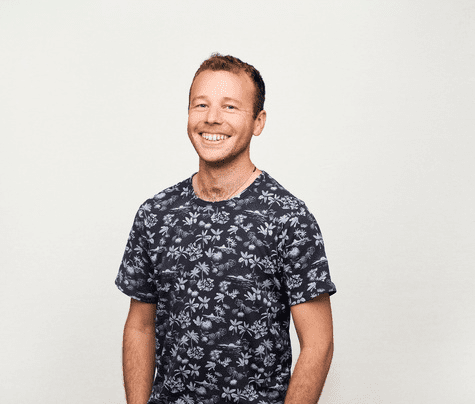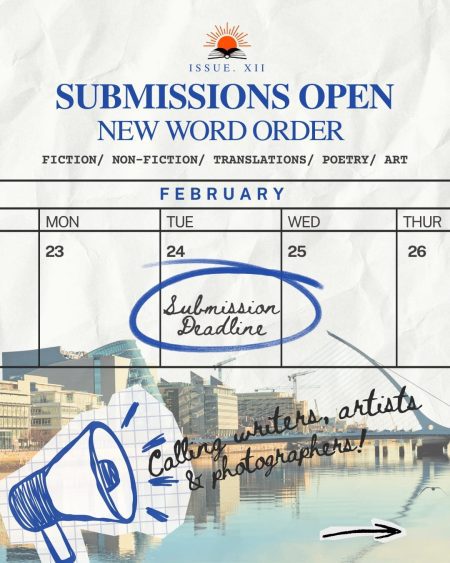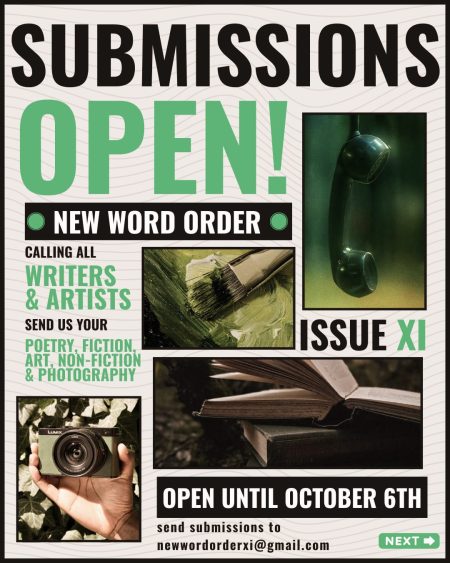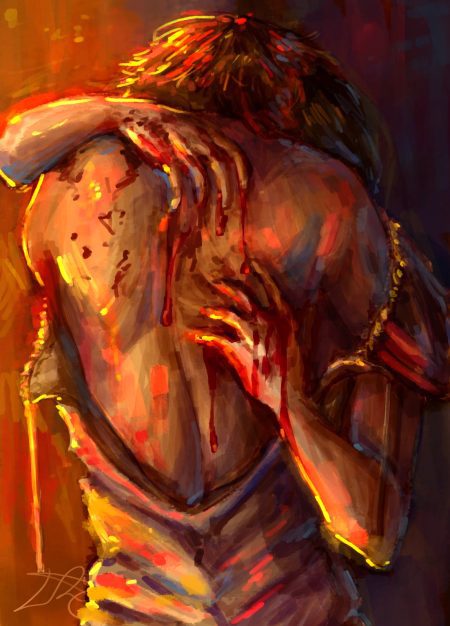New Word Order draws on the unique strengths of its editorial team to create each issue anew. As an exchange student from New Zealand and interview editor for this issue, I tapped into my homeland’s unique connections to have a conversation with spoken word poet and creative educator Ben Fagan.
This story from ‘Down Under’ gives you a glimpse into Fagan’s journey to making a career in the creative industry. Fagan is a published poet and alongside his partner runs ‘Motif Poetry’ a company which organises poetry slams across New Zealand and writing workshops for young New Zealanders. When he isn’t doing either of those things he is also the artistic director for the National Youth Drama School, which is a creative education program that I myself attended, and is where I first discovered Ben’s work. I was delighted to sit down with one of my artistic inspirations to discover how he made it where he is today.
Ella Ruddle: Considering our New Word Order readership is largely Irish I thought it would be important to start by asking who are you? What is the elevator pitch for Ben Fagan?
Ben Fagan: Well as of right now I am sitting in an apartment in Auckland, I moved here one month ago with my partner and toddler after a fair amount of time in Wellington, NZ and London creating and performing spoken word poetry. I am from Hawke’s Bay originally and I have just come off the back of a long time working in the arts as an artist myself but also working in arts education and facilitating poetry slams across New Zealand. I was appointed artistic director of National Youth Drama School and just got a new role in the media which is very interesting. A whole new world and a whole new bunch of learnings.
Ella Ruddle: We decided we would include a suggested prompt ‘Journey – what does journey mean to you’ in our call for submissions this year. I thought it would be equally interesting to track the journeys of our interviewees in this issue so looking back did you always know you wanted to end up as a writer and creative?
Ben Fagan: Depends on how young you’re talking! I think I wanted to be a geologist when I was like 5, and then at 6 I probably wanted to be a bird or something but at some point I discovered performance. I found like-minded people in local community theatre, drama class and attending NYDS from when I was 14. I don’t think I very had a clear plan or vision or direction of what I wanted to end up doing I just wanted to keep having interesting and fun experiences.
It’s only now that I draw a direct line from where I was to where I am. The discovery of poetry and writing was a massive unexpected left turn for me. I mean I was interested in English in high school but not writing my poetry. It wasn’t until I went to a spoken word event, a poetry slam, that the world of performed poetry took me on its journey which I think I’m still on.
Ella Ruddle: So did this discovery of poetry coincide with your time at uni? What did you end up studying?
Ben Fagan: I started in a theatre degree but I found it too academic and theoretical so I jumped into a degree in philosophy and media and kind of stepped out of the arts for a couple of years. I think it was near the end of my 3-year degree and a friend of mine from high school texted me wondering if I would come along and support them in a poetry open mic. Naturally, I said I would and went along. What blew me away, other than a lot of great talent on stage, was the concept of spoken word poetry. You get to write your own story but you didn’t have to be funny it was like a bonus if you were funny, you could be super serious or sad or happy or introspective whatever it was you could communicate a whole range of emotions which I enjoyed. Wellington was having a bit of a cultural moment I think, there had been a few spoken word artists who had grown a following through slams and whenever that happens it always drags some of the art form along with it.
Ella Ruddle: Not to linger on your 20s but as this is a university-run literary magazine and students are likely to read it, I guess one of our fears right now is what on earth do we do next. When you graduated did you feel a sense of ‘what on earth am I going to do?’
Ben Fagan: Oh definitely! So I became interested in spoken word in my last year of uni but when I got out I was unemployed. I got a data-entry grad role at the government which I bashed away at in real life but in the evenings I kept heading on to poetry nights and kept showing up. This was my first kind of introduction to actively writing all the time and I found a community that was writing heaps and going down to a cafe or a bar and trying stuff out on each other.
But, yes, obviously a career in poetry is not particularly well laid out, so I just kept kind of doing it and getting better and more confident. The kinds of gigs I was being booked for grew in variety and diversity and I started getting paid and travelling a little bit. I think it must have been 2 years of just showing up before I was invited to take a poetry show at the Edinburgh Fringe Festival.
My friend Jamie Sharp, who I was a NYDS student and teacher with in our early 20s and had planned, or knew at some point he wanted to run a venue at the festival in Edinburgh and said ‘hey if I was ever to do this would you want to bring a show over?’ I said yes and then in 2015 when his idea became a reality I wrote a 1 hour poetry show and took it over.
Ella Ruddle: So after doing Edinburgh you eventually moved to London, how did moving out of New Zealand change your writing?
Ben Fagan: I think what people took from my early spoken word stuff was the ‘pakeha-ness’ (New Zealander of European Descent) or ‘New Zealand-ness’ of it, just from how my stage persona was crafted and some of the nostalgic New Zealand references I used. So then moving away it made really clear the differences of New Zealand, right. You are suddenly keenly aware of this place and what makes you different, whether that is your cultural perspective cultural references the way you talk or just even your more abstract sense of the world or your sense of work or play.
Moving to the UK is one thing, there is the UK and then there is London. Two quite different places at times. I had extreme culture shock and while it’s very similar to NZ in lots of ways there were key differences and so what I continued writing about was New Zealand even more explicitly. I published a book of poems ‘Some Traveller’ while I was over there which was about being a New Zealander in London and that became my point of difference. So I kept writing about the same stuff but instead of being a Kiwi in NZ, I was a Kiwi in London and my work developed because of that.
Ella Ruddle: You are obviously settled in New Zealand now with your family, did you feel a pull to come back?
Ben Fagan: I was living in a particularly rough part of London at the time and there was an edge to the big city as well which wasn’t sitting with me. I got super involved in the spoken word scene when I was there, I was going to shows every night and performing every night and running slams. It was funny because that same cultural moment, or renaissance around spoken word that I described was happening in Wellington earlier was coming from London and LA. People writing for a local community stage could end up with a record deal or best-selling book and if we were kind of feeling the effects of that in Wellington the community in London was desperately aware of that fact.
It was amazing to step into that community and feel the edge. It wasn’t like your Wellington bar where everyone was finding each other and finding this art form – while there was a lot of this as well – there was a little edge of ‘If I win this slam it will lead to bigger and better things and maybe I’ll be rich and famous…’ This did happen to maybe 5 people across the 10 years, but there were a lot more than 5 people in that community so that competition and those kinds of attitudes were wearing on me a little bit.
Ella Ruddle: You founded with your Partner Sara Hirsch, Motif Poetry, which hosts slam competitions across New Zealand. You talk of this ‘edge’ that London had, how did you navigate not falling into this trap with your competitions?
Ben Fagan: I guess New Zealand lends itself to that anyway just by the manner of population size and the communities we were in. I worked for Apples and Snakes in London, which is the UK’s spoken word poetry premier production company and was paying attention and soaking it all in, knowing it would be wonderful to start something like this in New Zealand. So that’s what we did! It was an evolving thing because slams are a very particular beast. They started in Boston in the eighties and the format differs across the world. It’s a competition which means there are winners and losers but the judges are five random audience members holding Olympic-style scorecards. Our understanding of the initial kaupapa (principle/foundation) of poetry slams in Boston was that having random judges undercuts judging art with numbers.
We have tried as much as we can to stick to the kaupapa that it is bonkers to judge art with numbers to the decimal place, but what it does do is engage people who wouldn’t otherwise be interested in poetry. The audience critically engages with the writing more than they realise.
Ella Ruddle: You have so much going on with Motif, NYDS, and media work – do you still keep up with creative writing and your creative pursuits in your spare time?
Ben Fagan: Yeah so in 2020 I put out this series of poems about pakehatanga (pakeha culture) which was the bookend or the cumulation of all the years of writing and what I was exploring in ‘Some Traveller.’ I wanted to explicitly lean into what I was subconsciously trying to figure out: which was what is my place in Aotearoa? What is the pakeha place here? How did my family get here? Why do they talk the way they do? It was a good artistic challenge to get one poem out each month for ten months with video and animation. At the end of it, I came out of it with more questions than I did when I went in. At that point, I put a pin in actively chasing spoken word and moved into the realm of non-fiction. I started writing a collection of essays that kept asking these questions and I’m still working on that. It is all the things that poetry wasn’t. All the things that attracted me to poetry, nonfiction writing and book writing is the opposite. There is no quick feedback loop and no one claps at any point Ella which is devasting.
Ella Ruddle: A tough gig for a theatre kid!
Ben Fagan: Yes, having come to writing as a performer and writing for the stage with non-fiction you have to be in it for the long game and prepare for it to be less immediately gratifying which is probably a good thing for me. The process of writing has been intense and extraordinary by doing it properly I am wandering into fraught territory as the content becomes more relevant year by year. The people that I have wound up speaking to have been wonderful.
Ella Ruddle: Do you think the heaviness or the seriousness of this topic lent itself to a longer form than poetry?
Ben Fagan: They serve different purposes. Spoken word even if it is filmed is a lot more urgent. You hear it and it’s gone. I guess I wanted a challenge and I wanted more space to explore this stuff. I was determined for it to be non-fiction because I just really wanted to point out a bunch of things about being a white New Zealander. I am constantly amazed in the process of writing over how people are just there ready to be messaged. I often joke that my only tangible skill is “getting in touch.” If you can think of people who you can draw connections with who weren’t there before it is amazing. The book has been invaluable because any weird quirk of New Zealand history or culture I come across chances are you either have a friend in common or you can find the Facebook of a person or an email and then you can get a coffee with them and your life will always feel richer for it. That, too, is the benefit of writing.
Ella Ruddle: So is this your holy grail of advice – or do you have some other pearls of wisdom you would want to give to aspiring writers or performers?
Ben Fagan: Just keep doing it and figuring it out. I learned this the most through NYDS, it’s a place that comes together through a wing and a prayer. I have seen so many friends doing projects that get so bogged down with the details that it never really happens. It’s better to make a decision and get it wrong or do an average job –than making no decision at all. It’s better to just not know nothing about poetry and write a poem anyway and perform it onstage when you are 20 and then do it again to get a little bit better. I do have a lot of privilege that backs this up, I mean people do have some very meaningful barriers that stop them from making these choices which is why when you are on this journey you can always afford to help others out. But please just give it a go, doing is your best friend because things lead to more things!



